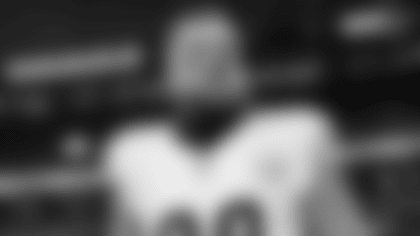'Adversity introduces a man to himself.' – Albert Einstein
For many young people, going through what Najee Harris did during his childhood might have broken them.
For Harris, it did just the opposite. It shaped him into the man he is today.
Harris faced adversity in his life, including living off and on in a homeless shelter, one that he actually went back to in April to host a draft party for the kids who are served there. It was that adversity and more that shaped him, that guided him, that made him who he is today and helped him get through some of the football challenges he has faced.
"That is one of the things," said Harris. "Me growing up with my childhood, how I was raised. There were times when I wouldn't be the luckiest person in the world. But there are other people going through worse than you."
It was during those tough times that there was always a constant in his life, his mother, Tianna Hicks. She helped him navigate through the challenges, she supported him every way she could, and she gave him the strength and love he needed.
"Words can't describe how much strength she gave me," said Harris. "There were times when my dad would be doing his thing and my mom would be the one taking care of us, putting food on the table. She tried giving us shelter. As one person with five kids, two is hard enough, doing all of that stuff shows how strong a woman can be, how strong women are when they have to provide for their family. People think strength is muscles and stuff. Strength is what she did, never quitting on us. It was inspiring. I love her for that. She always did her best to help us out."
The one thing Hicks did that really helped Harris was encourage him to be involved with sports, football in particular. He was a bundle of energy as a kid, and she thought it could be a positive outlet for that energy, keeping him out of the trouble that lurked on the streets in the neighborhoods where he was raised.
"That is why I played it," said Harris. "Funny story about me playing football. I am from California. There were all these bad neighborhoods where we were from, so we moved to Seattle. I got in some trouble. I wasn't playing football. They said I had too much energy, so I need to play sports. They put me in football.
"The first time out there playing we had a thing called 'hell week.' I was out there dying. It was a workout. At that age it was a lot because I never experienced that before. It was one of the first obstacles I faced. It was just a week. I was thinking I hate this stuff.
"We got to Friday and I didn't know it was just a week of that, and then it was over and headed to normal practice. I thought it was always like that. I got though it and then was like, okay, it's over. I got this and played."
Sports quickly became that positive outlet for him, a way to harness the energy and to overcome obstacles. As he became more emerged in it, he put all of his energy into it, working far beyond the hours he would be at practice to not just better himself, but as an escape.
"Later down the road I was playing more sports, I would be by myself, go to the park and just train by myself," said Harris. "Every time I got mad or got in trouble, I would just go train in the park.
"In high school, my coach would go to the practice field and just turn the lights on for me. He would show me how to turn off the lights, things like that. At Alabama, it was always open to the players. I would get cool with the janitors because they would be there at night. I would talk to them. It was just an outlet. Some people turn to drugs and alcohol. I turned to working out.
"It became an outlet to clear my mind. I would do it more and more to clear my mind, slow stuff down.
"A lot of times I would go at 9 or 10 at night. I used to do it around 11 or 12 at night, but then I had to get up early. I would go to the park or the football field and be by myself for an hour and half. I would come back refreshed."
As anyone who has worked out alone and faced the challenge of pushing themselves, you know it's not easy. Now double that with being a teenager, and you would think, no way. Not the case for Harris.
"Sometimes it would be easy, sometimes it would be hard," said Harris. "Sometimes I would have so much going on in my life that I would just go work out. When everything is stable, you have to remind yourself where you want to go, where you started. Most of the times it wasn't a challenge, but sometimes it was."
While he was working out, pushing himself to the limits in high school, he never really thought that it would take him where he is today, the Steelers No. 1 pick in the 2021 NFL Draft and a player who is pegged to resurrect the running game. He was just enjoying himself, taking it step-by-step.
"You never think of that in the back of your mind," said Harris. "When I am playing a sport, it's different. I don't really think about it. I just think about what I need to improve on each day and if I do everything right it will get me to that level. There was never a time in my life I thought I am going to do this. I just thought about I am going to try and keep improving. There was never a point I thought I have the ability to go into the NFL. It's always about improving. The outcome will be what you want eventually.
"It's a lot of mistakes and failures. I will take everything step-by-step because otherwise I will skip something. Sometimes I think too much about this and not get the other things right that I thought weren't important. What matters most is the little things are important, the details. It's completely off of me making mistakes. I don't think anybody is tested unless they make a lot of mistakes. It tests them, lets you see who you are. I failed a lot in life. Without me failing I wouldn't be here right now.
"It taught me a lot. It taught me how to get over obstacles. It taught me when adversity hits you, how are you going to react. In life not everything goes your way. When things don't go your way, how are you going to answer it, how are you going to react. Are you going to ball up and cry about it, blame other people or sit down and tell yourself this is what I need to focus and work on."
Harris is a man who isn't afraid to admit his mistakes. He isn't afraid to challenge himself. He isn't afraid to point out what he needs to do to get better, because there is no doubt, he is his own worst critic.
"I am, of course," said Harris. "Playing football, you have other critics. You turn on ESPN and the first thing they say is how you shouldn't draft a running back in the first round. If I would have listened to all of that, I wouldn't be where I am today. The only people I listen to are myself because I am the one on the field, my coaches, because they are coaching me, and my teammates. Every now and then I have my trainer, people in your circle.
"I am my own worst critic. All of the good stuff people say about you, you know there is stuff you need to improve on. You can't hide it. You know it will show up one day, so you need to be honest with yourself."














